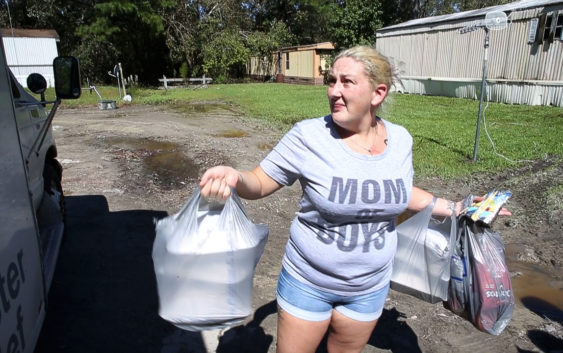- Even light rain causing flash flooding issues on Houston's north side
- LIST: High water locations, street flooding as heavy rain falls in the Houston area
- China on Alert for Heavy Rain and Floods From Typhoon Gaemi
- Flash flood threat; A day to be Weather Aware
- Power-Thirsty Bitcoin Miners Are Flooding the Energy Center of Texas
300,000 people in NC need help buying food after Florence

With the floodwaters receding, the state’s attention has turned to helping people with immediate needs and beginning to develop long-term strategies that would help North Carolina prepare for the next big storm, Gov. Roy Cooper said Thursday.
At the latest of what have been almost daily press conferences since Hurricane Florence hit two weeks ago, Cooper said most rivers are expected to return to their banks by early next week and that the death toll has climbed to 37.
The most recent death was that of an 85-year-old man who contracted an infection in a wound he suffered to his leg while cleaning up storm debris in New Hanover County. He died Sept. 25. No other details were available.
Cooper said that so far the majority of deaths have been people driving on flooded roads and again urged people to heed road closures and barricades.
“We don’t want to lose anyone else,” he said.
Parts of 270 roads remained closed Thursday, most of them secondary roads that were damaged by floodwaters, said Transportation Secretary Jim Trogdon. The N.C. Department of Transportation estimates it will cost about $100 million to make repairs, though that number is expected to rise as receding floodwaters reveal additional damage, Trogdon said.
Starting Friday, people who live in the 27 counties hit hardest by the storm and who don’t already receive food assistance from the government can apply for a debit card they can use to buy food to replace what may have been lost in a flood pantry or refrigerator that lost power for an extended time. Department of Health and Human Services Secretary Mandy Cohen said she expects as many as 300,000 people will be eligible for the so-called D-SNAP program and that they have an eight-day window to apply.
Cohen said they can go to www.ncdhhs.gov or call 211 to find out where to apply in person and said those who qualify will leave with the debit card that day. She said card will be loaded with $192 for an individual and $640 for a family of four.
About 1,500 people remain in shelters, Cooper said, down from 20,000 just after the storm. He said the state and the Federal Emergency Management Agency are working on temporary housing for people who lost their homes and that 560 had enrolled so far.
Among the other short-term steps, Cooper said the state would spend $4 million to provide mosquito control to counties in the affected areas.
More than 94,000 people have signed up for assistance from FEMA, already exceeding the total after Hurricane Matthew, said Albert Lewis, who is leading the agency’s efforts in North Carolina. Lewis said 350 FEMA disaster assistance teams are going door-to-door to register more and that the agency was looking to hire 180 local residents to help with the effort. He said the agency’s employees will be wearing “FEMA attire,” and said residents should ask to see their ID before talking to them.
Anyone with a home damaged by Florence can register for disaster assistance by calling 1-800-621-FEMA or go to www.disasterassistance.gov/.
As of Wednesday, 12,200 North Carolinians have applied for emergency unemployment benefits relating to the storm, according to the Division of Employment Security. Some employers have closed and some are inaccessible, and workers have been evacuated or lost their cars, said DES spokesman Larry Parker. Complicating the situation is the agency’s transition to a new computer system system, which required shutting down the computers that are used for processing unemployment claims. The system will be back up online Friday morning, Parker said. The agency advises applicants to be patient, as each unemployment claim must be individually verified by contacting the employer.
Cooper spoke more generally about long-term strategies to help North Carolina better weather a future storm. He talked about the need to build more “resilient” roads and communities and more affordable housing in areas hit by the storm. He said there should be a state program to buy out homeowners or elevate their homes in flooded areas for people who don’t qualify for federal assistance.
Cooper also the state should help communities make their sewage treatment plants less vulnerable to flood waters and should buy out hog-waste lagoons in flood-prone areas.
“I know the people of North Carolina have the grit and the will to recover,” he said. “I know our state is determined, and I know we will recover smarter and stronger than ever.”